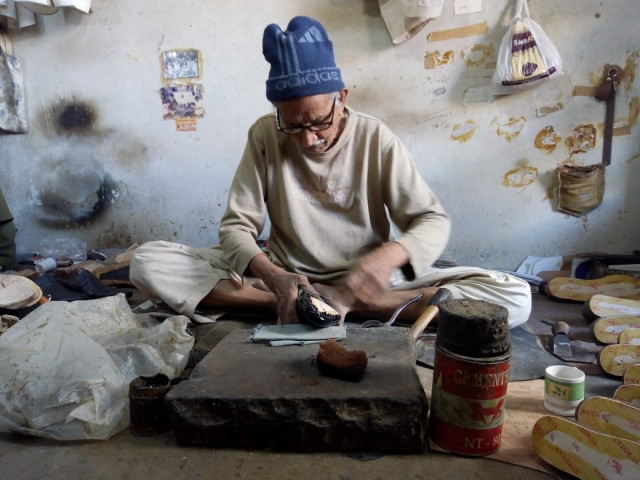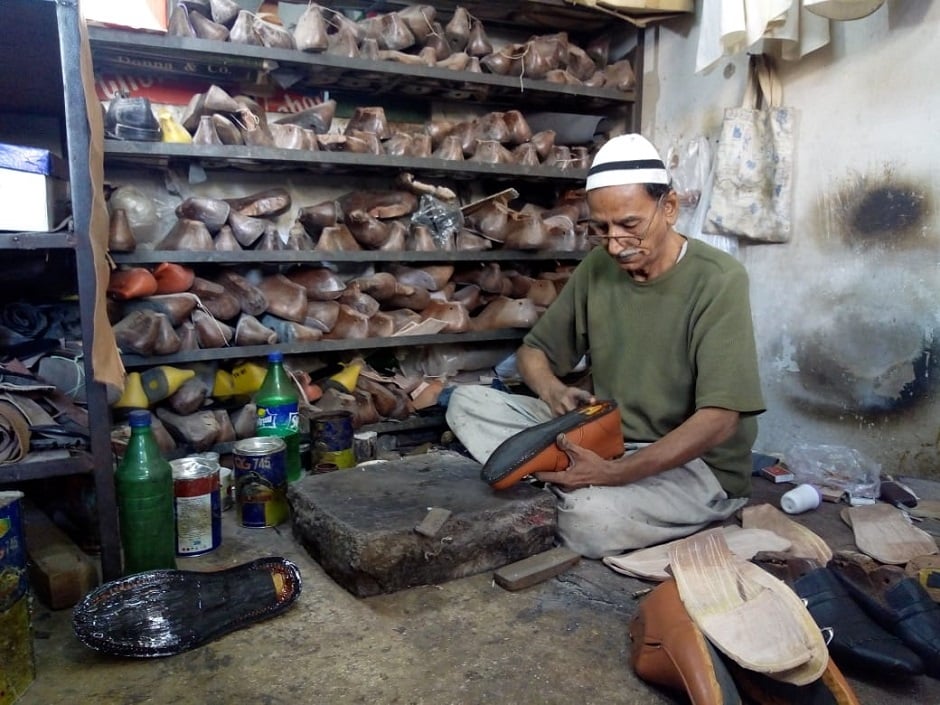The shoemaker - last man standing for a dying art
For over seven decades, Aijaz Hussain has stitched quality leather shoes for his famous and not-so-famous clientele

That was the start of Aijaz's love affair with the art of shoemaking. Over seven decades on, the affair is still strong. Aijaz now has his own workshop, where he still prefers to stitch shoes himself.
The workshop is located at Ancholi in Federal B Area. It is managed by Aijaz's son, Sajjad Hussain, who looks after the managerial affairs. Aijaz doesn't like to bother himself with those - his real passion lies in the intricate art of stitching and moulding shoes to perfection.
Dr Sharif Hashmani - the visionary eye doctor who envisioned a better Pakistan
A creature of habit
You see, Aijaz, who is now over 80 years old, belongs to the generation of artisans who worked hard all their lives and stayed sincere to their profession. "I still prefer to earn my bread by working with my hands," he told The Express Tribune. He still has a strong grip as he stretches the leather onto the wooden frame and shapes his creations.
"When I was starting out, there were only three professions to choose from," he chuckled. "You could either become a tailor, a shoemaker or you could go for a basic education to get a job at the local post office." Aijaz chose to be a shoemaker and has never looked back since.
Nostalgia for the past
When Aijaz started his first job, he made Rs5 a week, which was enough to cover his expenses. "That was not the time of industries," he says, adding that craftsmen lived much more comfortable lives than salaried persons. "We earned and spent on a daily basis. There were no banks, monetary organisations and industries in those days," he reminisced fondly.
Today, the octogenarian is one of the few expert shoemakers left in the profession. He can make any style or fitting, just by viewing the design once, be it traditional or contemporary. So adept is he at his craft that the leather cutting machine seems to work in sync with his fingers as he stands at it, cutting the leather strips into various designs for hours on end each day.
In his 70 years in the trade, Aijaz has prepared thousands of shoes, many of which were commissioned by large branded stores such as the English Boot House. He has also made shoes for famous personalities the likes of Pakistan's first prime minister, Liaquat Ali Khan and former prime minister and Pakistan Peoples Party founder Zulfikar Ali Bhutto, among others. On one of the occasions, he even got the chance to meet Bhutto, who he found to be very graceful and charismatic.
Adapting to the times
Aijaz's son, Sajjad, got a good education and could have gone into any profession but his father's passion was infectious. He too decided to join his father's business and the father-son duo set up the workshop together in 1988.
Sajjad takes care of the business side, selling shoes to individual customers on Shoe.com. He also liaises with big brand names that get shoes prepared at the workshop. A large number of their clientele also comprise the Pakistani diaspora who visit Karachi on occasion and get their shoes prepared from the workshop on special orders.
The process
A single pair of shoes, he explained, can take up to a week to make and involves four different stages, with a shoemaker designated for each stage. The upper part of the shoe is prepared by cutting the leather according to the design. Then, the bottom of the shoe, which is called the sole, is prepared and the upper part is fixed onto the sole with the help of wooden frame. The two parts are stitched together manually.
The business model
According to Sajjad, he gets a considerable number of orders each month from large urban centres other than Karachi. The price of the shoe is set according to design, quality of leather and the material used for the sole. "Our prices are on average 30% less compared to larger shops, while the quality is exceptionally good," he claimed. "Our shoes can last up to four to five years," he added.
According to Sajjad, cow skin leather is better than buffalo skin, which is why they use cow skin for the upper part of the show and buffalo skin for the sole. Customers can choose designs from catalogues or even come up with their own design to be made at the workshop.
 PHOTO: EXPRESS
PHOTO: EXPRESSTroubled future
According to Sajjad, fine-quality leather is available in Pakistan and fortunately, expert craftsmen like his father are still alive, who can train a new generation of craftsmen. Despite the enormous potential, he lamented, no one pays heed to this profession.
He cited the examples of Italy, Mexico, Thailand, Indonesia and Brazil, which have given the profession the status of an industry by harmonising it with modern trends. "Their craftsmen work standing on tables, aided by machines, while craftsmen in Pakistan still sit on the ground on slabs of stone," he said.
Sajjad does not see a bright future for the craft, unless the government acts fast.
The main problem, he foresees, is the lack of manpower. "Around 17 craftsmen from my own workshop have left this world over the last three decades, but they could not be replaced till today," he said. "This problem can only be solved if the younger generation is imparted training in this skill along with formal education," he suggested.
Aijaz concurred with his son. "The art of crafting leather shoes by hand is becoming extinct," he lamented, adding that the prime reason for this was the shortage of craftsmen.
"Today, you can count the number of good craftsmen on your fingers," he said. "The number of factories manufacturing good quality handmade leather shoes is even less," he added. Sajjad himself has been robbed on three different occasions, setting them back of a total of Rs350,000.
Despite the setbacks, however, Aijaz refuses to give up on his passion. He will continue to make shoes, surrounded by others his age at his workshop. He just hopes there is someone to keep the craft alive after him.



















COMMENTS
Comments are moderated and generally will be posted if they are on-topic and not abusive.
For more information, please see our Comments FAQ